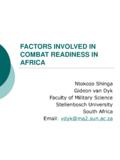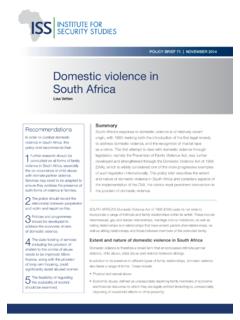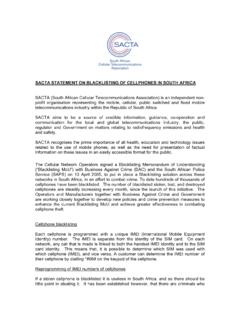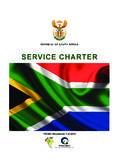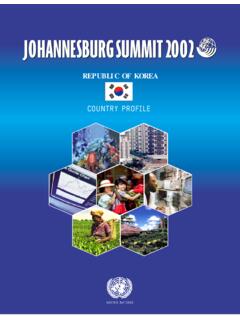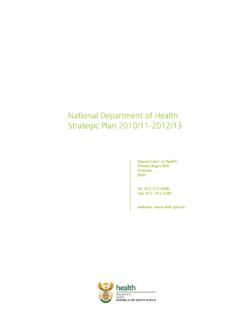Transcription of Case CCT 48/10 HUGH GLENISTER Applicant and …
1 CONSTITUTIONAL COURT OF south africa Case CCT 48/10 [2011] ZACC 6 In the matter between: hugh GLENISTER Applicant and PRESIDENT OF THE republic OF south africa First Respondent MINISTER FOR SAFETY AND SECURITY Second Respondent MINISTER FOR JUSTICE AND CONSTITUTIONAL DEVELOPMENT Third Respondent NATIONAL DIRECTOR OF PUBLIC PROSECUTIONS Fourth Respondent GOVERNMENT OF THE republic OF south africa Fifth Respondent together with HELEN SUZMAN FOUNDATION Amicus Curiae Heard on : 2 September 2010 Decided on : 17 March 2011 JUDGMENT NGCOBO CJ: NGCOBO CJ 2 Introduction [1] This is an application for leave to appeal against a decision of the Western Cape High Court, Cape Town (High Court) and an application for direct access. These applications concern the constitutional validity of the National Prosecuting Authority Amendment Act1 (NPAA Act) and the south African Police Service Amendment Act2 (SAPSA Act).
2 These two statutes, together, will be referred to as the impugned laws. The gravamen of the complaint relates to the disbanding of the Directorate of Special Operations (DSO), a specialised crime fighting unit that was located within the National Prosecuting Authority (NPA), and its replacement with the Directorate of Priority Crime Investigation (DPCI), which is located within the south African Police Service (SAPS). The impugned laws brought this about. [2] The DSO was established in 2001 under section 7(1) of the National Prosecuting Authority Act3 (NPA Act). Its purpose was to supplement the efforts of existing law enforcement agencies in addressing organised crime. The DSO was vested with powers to investigate and institute criminal proceedings relating to organised crimes or other specified offences.
3 On 27 January 2009, the President signed into law the impugned laws. The combined effect of the impugned laws was to disband the DSO and establish the DPCI. It is this effect of the impugned laws which is at the centre of the present 1 56 of 2008. 2 57 of 2008. 3 32 of 1998. NGCOBO CJ 3 constitutional challenge. The Applicant , Mr GLENISTER , a businessman, challenged the impugned laws in the High Court on various grounds. The background [3] These applications are a sequel to GLENISTER v President of the republic of south africa and Others ( GLENISTER I).4 In GLENISTER I, Mr GLENISTER and others unsuccessfully challenged the decision of the Cabinet to initiate the impugned laws. After they were signed into law, the Applicant challenged their validity on various grounds in the High Court.
4 This challenge, too, suffered the same fate but on different grounds. The Applicant now seeks leave to appeal against the decision of the High Court, alternatively, an order granting him direct access. [4] The President of the republic of south africa , the Minister for Safety and Security, now the Minister for Police, and the Minister for Justice and Constitutional Development, the first, second and third respondents respectively (respondents), are resisting both applications. Although the notice to oppose also cited the National Director of Public Prosecutions (NDPP), he did not play an active role in the In this Court, the Helen Suzman Foundation (amicus), a non-governmental organisation, applied for and was admitted as amicus curiae. Its objectives are to defend the values that underpin.
5 Liberal constitutional democracy and to promote respect for 4 [2008] ZACC 19; 2009 (1) SA 287 (CC); 2009 (2) BCLR 136 (CC). 5 The Government of the republic of south africa was cited separately in the notice to oppose as fifth respondent, but was represented in the proceedings by the first, second and third respondents. NGCOBO CJ 4 human rights. It joins the Applicant in challenging the validity of the impugned laws, but did so on their alleged inconsistency with this country s international obligation to establish an independent anti-corruption unit. [5] The full factual background giving rise to these proceedings is set out in GLENISTER It is therefore not necessary to repeat it, save so far as it is relevant to these proceedings. [6] The DSO was established in 2001 to supplement the efforts of existing law enforcement agencies in tackling organised crime.
6 In due course, concerns were raised within the criminal justice system and the intelligence community relating to the role and functioning of the DSO. To respond to these concerns, on 1 April 2005 the President appointed Judge Khampepe to chair a commission of inquiry (Khampepe Commission) to investigate and report on aspects of the DSO, including the rationale for its establishment, its mandate, its location within the NPA as opposed to the SAPS, and the relationship between the SAPS and the DSO. The resulting Khampepe Commission Report (Khampepe Report), signed on 3 February 2006, recommended that the DSO should continue to be located within the NPA, albeit with certain adjustments. Other recommendations related to the President s power to transfer oversight and responsibility over the law enforcement component of the DSO to the Minister for Safety and Security and the need to tackle the unhealthy relationship between the DSO and the SAPS.
7 6 GLENISTER I above n 4 at paras 1-2 and 10-6. NGCOBO CJ 5 [7] Cabinet appeared to approve the Khampepe Report. A Cabinet statement of 29 June 2006 reveals that it endorsed the National Security Council s decision to accept, in principle, the recommendations of the Khampepe Commission, including the retention of the DSO within the NPA. A further statement of 7 December 2006 stated, among other things, that Cabinet had reviewed progress in implementing the recommendations of the Khampepe Commission. [8] Meanwhile, the African National Congress (ANC), the ruling party, at its 52nd national conference, held in Polokwane in December 2007, adopted a resolution calling for a single police service and the dissolution of the DSO (Polokwane Resolution).
8 [9] On 12 February 2008, following the Polokwane Resolution, the Minister for Safety and Security, speaking in the National Assembly, proposed the dissolution of the DSO and the creation of a new unit under the SAPS to deal with organised crime. In the same month, the Director-General of the Department for Justice and Constitutional Development stated during a radio interview that the DSO would be amalgamated with the SAPS. The legislative programme of the Department for Safety and Security for 2008 indicated that laws dealing with the DSO would be placed before Parliament during that year. NGCOBO CJ 6 [10] Following a Cabinet meeting in April 2008, the Presidency issued a statement to the effect that Cabinet had approved the NPAA Bill and the General Law Amendment Bill, later renamed the SAPSA Bill (the Bills).
9 Among other things, these Bills proposed to dissolve the DSO and replace it with the DPCI. The stated purpose of the Bills was to strengthen the country s capacity to fight organised crime and to give effect to the decision to relocate the DSO from the NPA to the SAPS. [11] As I have indicated above, the Applicant and others challenged the decision to initiate the Bills. The North Gauteng High Court held that it had no jurisdiction to hear the application. By the time the matter reached this Court by way of an application for leave to appeal and an application for direct access, the Bills had not only been approved by Cabinet but were then before Parliament. This Court, in GLENISTER I, dismissed the challenge, holding that it had not been established that it would be appropriate for this Court to intervene in the affairs of Parliament nor that material and irreversible harm would result if the Court did not intervene at that [12] On or about 23 October 2008, the impugned laws were passed by Parliament, and on 27 January 2009 they were assented to and signed by the President.
10 On 17 April 2009, the Applicant challenged the constitutional validity of the impugned laws in the High Court. 7 Id at para 57. NGCOBO CJ 7 Proceedings in the High Court [13] In the High Court, the Applicant based his constitutional challenge on several grounds. The one challenge was based on the absence of a rational basis for the enactment of the impugned laws. The others alleged failure to comply with various constitutional obligations relating to accountability; cultivating the principles of good human resource management practices and good labour relations; upholding international obligations; facilitation of public involvement; protecting values enshrined in the Bill of Rights; and allowing the NPA to properly exercise its functions.











